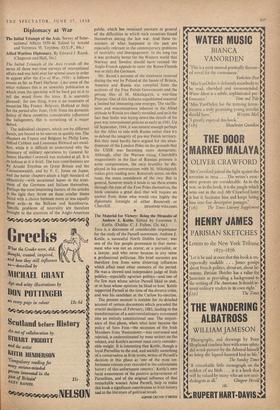Diplomacy at War
The Initial Triumph of the Axis. Survey of Inter- national Affairs 1939-46. Edited by Arnold and Veronica M. Toynbee. (O.U.P., 84s.) Allied Wartime Diplomacy. By Edward J. Rozek. (Chapman and Hall, 56s.) The Initial Triumph of the Axis rcunds off the series of these war-time surveys of international affairs and was held over for several years in order to appear after the Eve of War, 1939: it follows events as far as Pearl Harbour. Like some of the other volumes this is an unwieldy publication in which even the specialist will be hard put to it to tell the wood from the trees. It is unevenly planned : for one thing, there is no treatment of countries like France, Belgium, Holland or Italy for the period after June, 1940. Since the domestic Policy of these countries considerably influenced the belligerents, this is something of a major defect.
The individual chapters, which are by different bands, are bound to be uneven in quality too. The chapters on France and Belgium by Philip Lane, Alfred Cobban and Constance Howard are excel- lent, while it is difficult to understand why the summary of military operations by General Sir James Marshal Cornwall was included at all. It is as tedious as it is brief. The best contributions are by Arnold Toynbee on Great Britain and the Commonwealth, and by F. C. Jones on Japan, and the better chapters attain a high standard of objectivity—with occasional lapses in the treat- ment of the Germans and Italians themselves. Perhaps the most interesting feature of the articles Is the light they throw on those smaller States faced with a choice between more or less equally great evils—in the Balkans and Scandinavia. Specific problems of neutrality are therefore brought to the attention of the Anglo-American
public, which has remained unaware in general of the difficulties in which such countries found themselves during the last war. And these re- minders of what happened in the past are especially relevant to the contemporary problems of neutrality and disengagement. In the long run it was probably better for the Western world that Norway and Sweden should have. resisted the Anglo-French appeals to enter the Russo-Finnish war or defy the Germans.
Mr. Rozek's account of the treatment received during the war by Poland at the hands of Britain, America and Russia was compiled from the archives of the Free Polish Government and the private files of M. Mikolajczyk, a war-time Premier. Out of this hitherto unpublished material a limited but interesting case emerges. The vacilla- tions and misconceptions inherent in the Allied attitude to Russia are clearly revealed, and so is the fact that Stalin was laying down the details of his post-war international policies as early as 1941. Up till September, 1944, it was natural enough perhaps for the Allies to side with Russia rather than try to defend the integrity of pre-war Polish territory. But they need hardly have argued for the aban- donment of the London Poles on the grounds that the USSR was becoming more democratic. Although, after the Warsaw rising; Churchill's magnanimity in the face of Russian pressure is some compensation, the racy brutality he dis- played in his conversations with M. Mikolajczyk makes grim reading now. Roosevelt seems, on this issue, the more considerate of the two. But in general, however much it tends to see these events through the eyes of the Free Poles themselves, the book contains a great deal that will require an answer from those who would rate highly the diplomatic foresight of either Roosevelt or


































 Previous page
Previous page